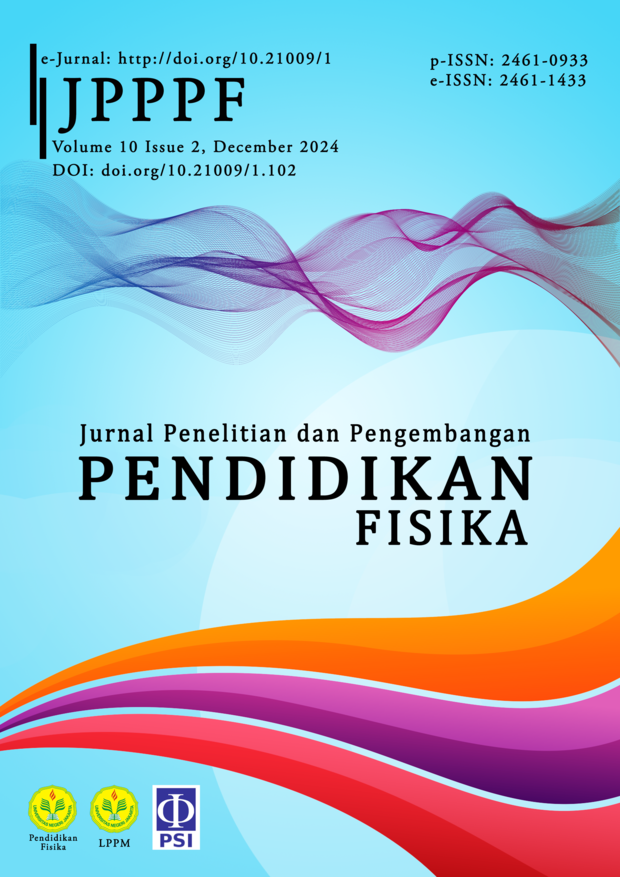Innovation Learning on The Topic of Sound: Rasch Analysis on Team Game Tournament with Uno Card Media
DOI:
https://doi.org/10.21009/1.10208Keywords:
Teams Game Tournament (TGT), Rasch model, learning outcomesAbstract
This study aims to analyze the characteristics of the Teams Game Tournament (TGT) learning model instrument using the Rasch model on the topic of sound, incorporating Bloom's cognitive features. The analysis focuses on validity, reliability, discrimination capacity, and difficulty level to determine the instrument's feasibility. The study adopts the classroom action research paradigm. The instrument comprises ten multiple-choice questions. The findings indicate that the instrument demonstrates adequate validity within an acceptable range. The reliability analysis yields a Cronbach's alpha score of 0.82, indicating high reliability, with item reliability at 0.36 and person reliability at 0.32. Additionally, the discriminating power meets the criteria, as shown by Infit Mean Square (MNSQ), Outfit Z-Standard (ZSTD), and Point Measure Correlation (PT Measure Corr). Regarding difficulty level, the instrument includes five questions categorized as difficult, three as moderate, and two as easy.
References
Aliffah, N, et al. (2013). Pengaruh Model Pembelajaran Kooperatif Tipe Teams Games Tournament (TGT) dan Gaya Belajar Terhadap Prestasi Belajar Peserta Didik pada Materi Pokok Hidrolisis Garam Kelas XI Semester 2 SMA Negeri 4 Surakarta Tahun Pelajaran 2012/2013. Jurnal Pendidikan Kimia. 2(4), pp. 80-89.
Anggiasari, N.A., Asrori, M. and Sarosa, T. (2018). Comparative Study Between Using Cooperative Learning Model Teams-Games-Tournaments (TGT) and Direct Instructional Method (DI) to Teach Students’ Reading Comprehension. English Education, 6(3), pp.367-378.
Ardilla Ayu Febrina. (2016). The Effect of Cooperative Learning Model TGT (Team Games Tournament) with Digital Games Against Student Results At Concept Optical Instruments. Thesis Physics Education Program, Science Education Department, Faculty of Tarbiyah and Teacher Training, State Islamic University of Syarif Hidayatullah Jakarta.
Bond, T. G., and Fox, C. M. (2007). Applying the Rasch Model: Fundamental Measurement in the Human Sciences. Psychology Press.
Cecchini, J.A., Fernandez-Rio, J., Mendez-Gimenez, A., Gonzalez, C., Sanchez-Martínez, B. and Carriedo, A., (2021). High versus low-structured cooperative learning. Effects on prospective teachers’ regulation dominance, motivation, content knowledge and responsibility. European Journal of Teacher Education, 44(4), pp.486-501.
Chen, S., Ouyang, F. and Jiao, P., (2022). Promoting student engagement in online collaborative writing through a student‐facing social learning analytics tool. Journal of Computer Assisted Learning, 38(1), pp.192-208.
Djamarah, B., Syaiful, S., and Aswan Zain. (2006). Strategi Belajar Mengajar. Jakarta: PT Rineka Cipta.
Fajri, L, et al. (2012). Upaya Meningkatkan Proses dan Hasil Belajar Kimia Materi Koloid Melalui Pembelajaran Kooperatif Tipe TGT (Teams Games Tournament) Dilengkapi Teka-Teki Silang Bagi Peserta didik Kelas XI IPA 4 SMA Negeri 2 Boyolali Pada Semester Genap Tahun Ajaran 2011/2012. Jurnal Pendidikan Kimia. 1(1): 89-96.
Fina, K. (2022). Analisis Penguasaan Konsep Fisika Siswa SMP pada Materi Suhu dan Kalor menggunakan Rasch Model. Repository.upi.edu.
Hamzah, B.Uno, and Lamatenggo, N. (2016). Landasan Pendidikan. Jakarta: Bumi Aksara.
Haryono, T., and Budi, S. (2021). Effectiveness of Rasch Model in Evaluating Cooperative Learning Instruments. Journal of Educational Psychology.
Johnson, D. W., and Johnson, R. T. (2009). An Educational Psychology Success Story: Social Interdependence Theory and Cooperative Learning. Educational Researcher, 38(5), pp. 365-379.
Lestari, M. (2022). The Implementation of Teams Games Tournament (TGT) Using Uno Cards in Physics Education. Journal of Science Education, 8(2), 97-105.
Luo, Y.J., Lin, M.L., Hsu, C.H., Liao, C.C. and Kao, C.C. (2020). The effects of team-game-tournaments application towards learning motivation and motor skills in college physical education. Sustainability, 12(15), p.6147.
Møgelvang, A. (2024). Cooperative learning in oceanography. Oceanography, 37(1), pp.160-162.
Muslich, M. (2011). Pendidikan Karakter Menjawab Tantangan Krisis Multidimensional. Jakarta: Bumi Aksara.
Rani, R. (2019). Enhancing Student Engagement with Game-Based Learning in Science Education. International Journal of Educational Development, 6(3), 78-85.
Sagala, S. (2012). Konsep dan Makna Pembelajaran. Bandung: Alfabeta.
Siregar, D., Tarigan, S.H. and Sofiyah, K. (2024). Pengaruh Model Pembelajaran Teams Games Tournament (Tgt) Untuk Meningkatkan Hasil Belajar Matematika Terhadap Materi Penjumlahan Dan Pengurangan Kelas III SD. SCIENCE: Jurnal Inovasi Pendidikan Matematika dan IPA, 4(1), pp.7-15.
Siswati, H.A., Sunarno, W., Suparmi. (2012). Pembelajaran Fisika Berbasis Masalah dengan Menggunakan Metode Demonstrasi Diskusi dan Eksperimen Ditinjau dari Kemampuan Verbal dan Gaya Belajar. Jurnal Inkuiri, 1(2) pp. 132-141.
Slavin, R. E. (1995). Cooperative Learning: Theory, Research, and Practice. Allyn & Bacon.
Stokes, J. (2024). Collaborative Critical Thinking Problem Sets Enhance Student Perceived Learning and Promote Student Practice Outside of the Classroom. Physiology, 39(S1), p.801.
Sudjana, N. (2001). Penelitian Hasil Proses Belajar Mengajar. Bandung: PT Remaja Rosdakarya.
Suprijono, A. (2009). Cooperative Learning. Yogyakarta: Pustaka Pelajar.
Tarim, K. (2009). The Effects of Cooperative Learning on Preschoolers’ Mathematics Problem-Solving Skills. Educational Studies, 35(1), 29-38.
Downloads
Published
How to Cite
Issue
Section
License
Copyright (c) 2024 Yovita Hanindya, Supahar Supahar, Indiyah Lestari, Budi Handono, Iqbal Dyaz, Naura Zukhruf

This work is licensed under a Creative Commons Attribution 4.0 International License.











